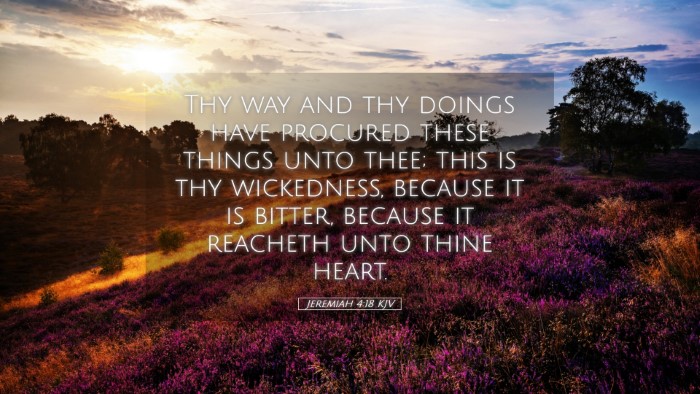Commentary on Jeremiah 4:18
Text of Jeremiah 4:18: "Your own conduct and actions have brought this upon you. This is your punishment; how bitter it is! how it pierces to the heart!" (NIV)
Introduction
This verse serves as a poignant reminder of the consequences of sin and the inevitable outcomes of one's actions. The prophet Jeremiah, often referred to as the "weeping prophet," poignantly captures the essence of divine judgment alongside the sorrow it brings.
Understanding the Context
Jeremiah's ministry took place during a time of impending disaster for the people of Judah. As he communicates God’s message, he does so amidst societal decay, moral corruption, and idolatry. This backdrop enhances the weight of his declarations in Jeremiah 4:18, making it a critical moment in understanding the relationship between behavior and consequences.
Public Domain Commentary Insights
Matthew Henry's Commentary
Matthew Henry emphasizes that the verse encapsulates the self-inflicted nature of Judah’s suffering. He notes:
- “That which comes upon us, by the course of divine Providence, is usually the effect of our own corruptions and sinful practices.”
- Self-Reflection: Henry exhorts the reader to contemplate their own behavior, suggesting that impending calamities serve as a wake-up call to self-examination and repentance.
In Henry's view, this verse acts as a mirror, reflecting the grave reality of the consequences of sin—a truth that resonates through ages.
Albert Barnes' Commentary
Albert Barnes offers a detailed exposition of the theological implications behind the verse. He asserts:
- “The ruin of Judah is attributed to their own acts.”
- Divine Justice: Barnes underscores that the principle of reaping what one sows is a consistent theme throughout Scripture. He suggests that the 'bitterness' mentioned is emblematic of divine displeasure that results from moral failings.
Furthermore, Barnes encourages believers to understand that God’s justice is not arbitrary; rather, it is rooted in His holiness and righteousness.
Adam Clarke's Commentary
Adam Clarke provides a deep dive into the literary structure of the text, pointing out the powerful emotional language Jeremiah employs. He remarks:
- “The anguish of the heart is a formidable aspect of facing divine judgment.”
- The Nature of Punishment: Clarke contemplates the human experience of divine judgment, advocating for a balance between fear and the potential for reconciliation through repentance.
Clarke's perspective beckons the reader to recognize their part in the narrative of redemption while acknowledging the pain that accompanies disobedience.
Theological Reflections
This verse can stimulate profound theological discourse concerning God's relationship with humanity. It evokes fundamental questions regarding:
- The Nature of God: How does God's justice intersect with His love? This verse provokes thought around God’s duality as both loving and just.
- Human Responsibility: Personal accountability stands at the forefront; believers must grapple with their actions and their consequences.
Applications for Pastors and Theologians
For those engaged in pastoral ministry or theological discourse, Jeremiah 4:18 serves as a rich resource for preaching and teaching.
- Encouragement for Self-Examination: Utilize this verse to advocate for self-reflection among congregants, fostering an awareness of one's own sin and the need for repentance.
- Reminders of Grace: While the verse highlights judgment, it is essential to balance this message with the ultimate grace offered through Jesus Christ, encouraging hope and restoration.
- Raising Awareness of Societal Sin: Challenge congregations to recognize collective failings within communities and nations, urging a return to righteousness.
Conclusion
Jeremiah 4:18 does not merely captivate through its narrative of judgment; rather, it beckons an ongoing dialogue regarding sin, accountability, and the nature of God’s justice. In its depths, we find a well of insights pertinent for today’s pastors, students, theologians, and scholars alike. May we glean the lessons of this verse not only for intellectual engagement but for transforming our hearts and actions in alignment with divine truth.


